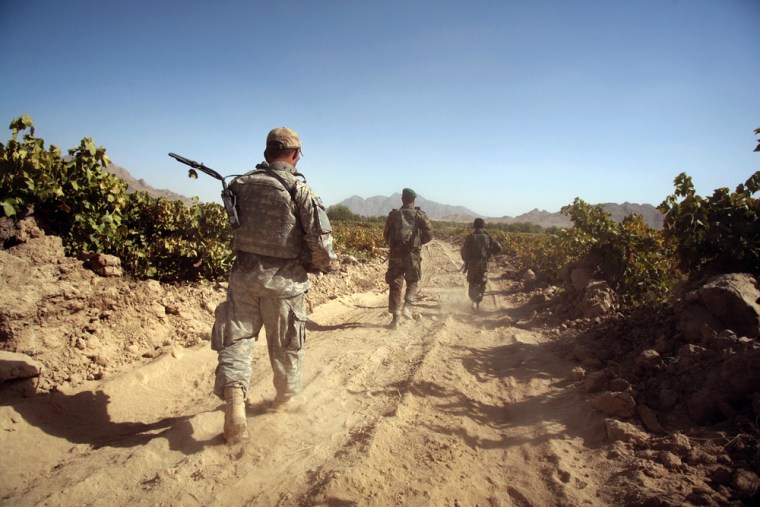WASHINGTON — Nearly five years after the U.S. military drove the Taliban out of Afghanistan, total victory appears as distant and remote as the long-embattled nation itself.
In fact, after several years of relative calm, the Taliban and al-Qaida have staged a dramatic comeback, adopting the insurgent tactics that have been perfected with deadly efficiency in Iraq. More than 70 suicide bombings have killed scores of Afghan civilians this year, a 400 percent jump over 2005. Roadside bombs have more than doubled.
NATO military officials claim at least 40 percent of the attacks are launched from Taliban camps across the border in Pakistan, where both the Taliban and al-Qaida live, train and operate with apparent impunity.
The Afghan government continues to struggle to establish its credibility and spread its authority beyond Kabul. At the same time the U.S. recently cut developmental aid to Afghanistan by 30 percent and less than half of the $15 billion promised in international aid has been delivered.
Meanwhile, opium production in Afghanistan has exploded. A United Nations report in September revealed a bumper poppy crop produced 6,100 metric tons of opium, a 50 percent increase over the previous year.
NATO's top commander, U.S. General James Jones, warns Afghanistan is at a critical crossroads, calling it "a moment of truth."
Aggressive assault
As a result, 40,000 U.S. and NATO combat forces are engaged in an aggressive campaign against the Taliban. Last month, Operation Medusa killed more than 400 Taliban fighters in four southern provinces. The Taliban disputed the casualty count but admitted their fighters were forced to make a "tactical retreat."
Despite the success of the mission, U.S. military commanders were shocked by the intensity of the fight and the increased sophistication of Taliban command-and-control capabilities.
More troubling, though, is the decision by Pakistani President Pervez Musharraf to end a military offensive against the Taliban and al-Qaida dug deep into the ungoverned tribal areas in western Pakistan.
Musharraf denies that a treaty signed with tribal leaders to pull his troops out of the fight creates a safe haven for the Taliban and al-Qaida, but top U.S. military commanders have their doubts. "I'm very, very skeptical," said General John Abizaid, the top U.S. commander for the Middle East. "I'll believe it when I see it."
Taliban resurgence
Reports from inside Pakistan show Abizaid has good reason to be worried. Sources within Pakistan tell NBC News that the "Talibinization" of Waziristan province was well underway before the treaty was signed, creating the same kind of fundamentalist authoritarian state they had established while ruling Afghanistan.
Robert Kempler of the International Crisis Group, an independent think tank that tries to prevent conflicts, says the Taliban are openly "attacking women who work for relief organizations, closing down cinemas, carrying out their own form of justice — and we don't see the Pakistani state stepping in to stop it."
These developments have not been lost on the White House, so much so that President Bush decided to force the issue, summoning Musharraf and Afghanistan's President Hamid Karzai to the White House last week in an effort to effect an agreement. In the end, however, there was no sign of a settlement.
‘Narco state’
General Jones, however, believes a much larger threat to the future of Afghanistan may be the opium trade, warning recently that Afghanistan is on the verge of becoming a "narco state."
The impact of the drug trade has become so pervasive it reaches almost all levels of Afghan society, breeding corruption within the government and creating an entire class of Afghan farmers and laborers addicted to the money generated by the drug trade.
In addition, part of the $3 billion dollars in annual drug profits is being used to finance, train and equip the Taliban in Afghanistan (an irony, since the Taliban government was quite effective until its overthrow in 2001 in curtailing the opium trade).
Defense Secretary Donald Rumsfeld has stubbornly resisted pressure to get the U.S. military directly involved in fighting Afghanistan's drug war. Meanwhile, Lt. Gen. Karl Eikenberry, the lead commander of U.S. and NATO forces in Afghanistan, stressed that "the critical task at this stage is strengthening the government of Afghanistan, developing the economy, and helping to build Afghan civil society."
In the meantime, soldiers on the ground are eagerly looking forward to Afghanistan's upcoming winter when, because of the harsh conditions, there's normally been a break in the violence.
In Afghanistan, unfortunately, there is always next spring.
